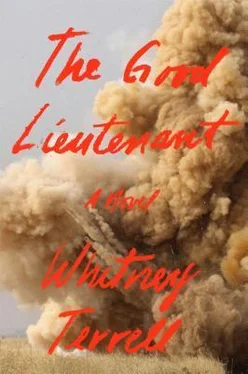I am working with the Americans. But I can’t be with them all the time.
Why don’t you tell them that you’re in danger?
I am not in danger , Faisal wrote. You are in danger.
I am not in danger if I do not have a side. If anything, I am in favor of the Americans. None of them have bothered me.
Are you saying that you would support a group of infidels against your own countrymen? Do you have no pride in your religion?
Ayad laughed at this last note when he read it. You are not a religious person , he scribbled. You don’t fool me.
Faisal considered this, stone-faced. Then responded: You don’t know what I am.
Ayad had had long arguments with his mother about what, exactly, Faisal was back in the day. A shape-shifter. A user. That was what she called him. According to her, the only reason a Shi’ite like Faisal played with him was that the other Sunni kids ignored him. That and the fact that what Faisal really wanted was to marry Ayad’s cousin Hanan, who’d been living at Ayad’s house then. Admittedly, there had been afternoons when Ayad could remember his friend sitting out at the wooden picnic table just below him, in his mother’s rose garden, doing voices to make Hanan laugh. On the other hand, the other Sunni kids ignored Ayad too. So maybe there had been some using, but it had gone both ways. Normal using, if there was such a thing. So Ayad had worked out a compromise: Faisal could still play up on the roof, in the spaceship, which he’d helped build. And which Ayad considered to be the best avatar of his friend, a physical manifestation of his desire to escape who he was consigned to be.
The spaceship as a whole had always been a frivolous project. Its blueprints had been drawn up loosey-goosey — the word Faisal had preferred was mu’wajj , or literally “crooked”—on bits of paper; then it was constructed from scraps. And yet despite its absurdity, its impracticality, there had never been a moment during its conception and assembly, executed on this very same gravel-covered rooftop more than a decade ago, when Faisal had dropped the extraordinarily grave and deadpan seriousness that he adopted when consulting his friend over aspects of design.
Unlike you, I am on all sides , Faisal wrote. Especially the side that wins.
Which side is that?
I don’t know yet.
As the two men crouched beside the rusting remains of their old toy, Ayad could still remember Faisal’s expression, his exact method of nodding and running a thumbnail through his eyebrow, as he pored over one of Ayad’s drawings, or picked up a pen and responded to one of his notes on their pad. He mentally cleared the present from the rooftop and relit the roof with the daylight of the past, revealing the palomino speckles of its pebbles interseeded with doomed eucalyptus shoots (he could summon these familiar things as casually as a photo in a book), and then — though this took a bit more concentration — he disassembled the spaceship into its constituent pieces, hoisted the great geared wheel that served as its floor back out into the open air, and balanced it atop two sawhorses.
Faisal’s father had retrieved the wheel from a grain works in Ramadi and hauled it onto the roof. A quiet, sepulchral man, he’d rented a house from Ayad’s family, done odd jobs for Raheem al-Najafi, for whom Ayad had worked too. But it was Faisal who’d imagined the spaceship. Faisal who’d bartered for the American comics that they’d read, secretly, inside its shadowed cockpit. Faisal who’d brought his old telescope out, charting the stars, and convinced Ayad to draw the worlds they would see. Ayad’s mother had disliked the spaceship, largely because she had disliked Faisal. But in Ayad’s opinion, the shape-shifting quality that allowed Faisal to recast the two of them as astronauts had been Faisal’s strength, the very thing that allowed them to be friends. In that sense, it had seemed natural when Faisal applied to work with the Americans. Translating paid one hundred dollars a day — a gigantic sum. In almost no time, Faisal had a better cash flow than Ayad’s family, especially after their government pension payments dropped away. And so it unnerved Ayad that Faisal was standing here on the same roof where they’d played as children, asking for help. But not exactly asking either — more like telling Ayad what he should do, as if he didn’t have a choice, while at the same time pacing about so nervously that it seemed clear that maybe it was Faisal himself who didn’t have a choice.
Ayad wasn’t going to rent him his property. That was for sure. On the other hand, he had no power to enforce his refusal, so he was going to have to find some other appeal. Downstairs, Ayad made chai in the kitchen, offered it. They sat alone in the living room, Faisal casting his gaze about the environs, as if trying to match it up with the past.
They had once watched movies here, before Faisal had gotten himself banned. Faisal had always been the better actor, but in the silence that was between them — a silence that Faisal had always accepted better than anybody else — Ayad tottered over to him, imagining a pantomime. What should he act out? A hug? An embrace? Fall to his knees and beg? He paused and squatted before his old friend. Nothing so dramatic; Faisal had never been a fan of sentimentality. Over the past two weeks he’d watched the headlights gradually work their way in, stopping sometimes in a field all night, other times a steady crisscrossing to the south until, two nights ago, a small patrol, two vehicles, had cruised the road outside their gate. They’d stopped, the twinned white lights of reverse blinking on, and jolted up the driveway for a sniff. Then he’d seen Faisal’s blue sedan come speeding up, heard an angry shout, and their brights had flared, whitening the walls of his father’s house, as the patrol pulled away.
I am afraid I cannot sell the spaceship , Ayad wrote. He reached across and held Faisal’s hand, his expression (he hoped) as grave and deadpan as his friend’s had been when he’d built the spaceship. The world is not prepared for such advanced technology.
Stay here was what he meant. Hide with me.
* * *
Pulowski tucked his hands beneath his nuts. He was in the back of Fowler’s Humvee; Fowler and her driver, Carl Beale, occupied the front. The thing that he was processing was how much smarter he’d felt in Tennessee. Leafy streets? Regis and Kathy in the morning? A coffee shop called the Ethical Bean? The whole town had seemed a kind of cartoon invitation to irony: Hey, guess what, these people don’t care about your soldiering. It crossed his mind that maybe the exact thing that had comforted him about being home was that America seemed designed for the easy take: Regis Philbin, clown. New England Patriots, arrogant. Even Bill Moyers, his mother’s favorite, didn’t do much more than hit gassed-up Republican piñatas off a tee. While Iraq, rolling past Fowler’s Humvee window, left him slack-jawed and empty. Looted rows of strip malls. A lot filled with pureed bricks. A string of trash-roofed garages. Then the blocky quad of the University of Baghdad Agricultural College, identified by a neat roadside sign in English. “First time I came out,” Fowler said, pointing to the college, “the thing that surprised me the most was the architecture. For an Arab country, it seems pretty sixties.”
It was the fourth or fifth cheerful thing she’d said to him since they’d left the gate, a fact that made no sense, given how he’d treated her recently. But his nuts tingled anyway, appreciatively. “What were you expecting, minarets?” he asked.
Читать дальше












